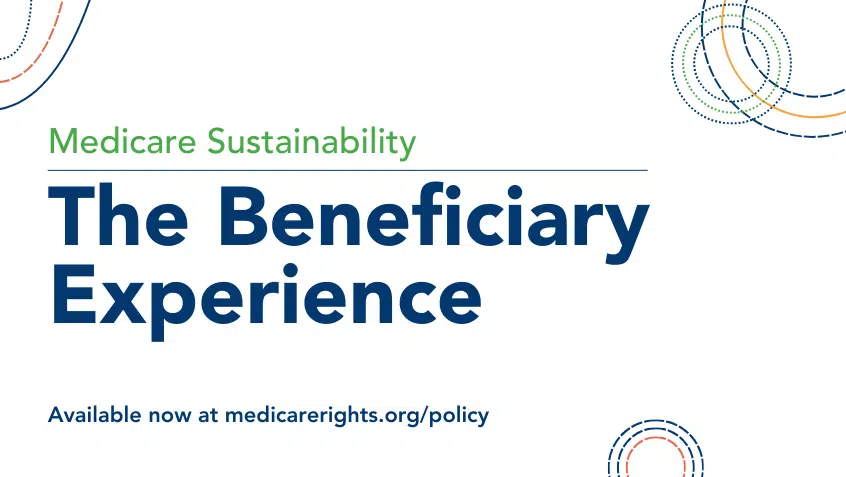Join Us Live for a Discussion on Medicare, Democracy, and the Future of Health Care
Medicare Rights Supports Important Proposals for Medicare Advantage and Part D Plans

This week, Medicare Rights submitted comments on a proposed rule that would make some important changes to Medicare Advantage (MA) and Part D plans. If finalized, this rule would alter how MA plans can use third parties to market to consumers; require plans to communicate with enrollees in multiple languages; change how Part D plans determine negotiated drug prices; and improve aspects of Dual Eligible Special Needs Plans (D-SNPs)—special types of MA plans that enroll only people who are eligible for both Medicare and Medicaid.
On Medicare Rights Center’s national helpline, we have seen nearly a 200% increase in calls and questions around inappropriate marketing in recent years. In the proposed rule, the Centers for Medicare & Medicaid Services (CMS) reports that complaints to the agency about marketing have also more than doubled, and points to third-party marketing as a major reason why. These third-party marketing organizations (TPMOs) advertise heavily, often on TV, and make big claims for what people can receive if they switch to an MA plan. In the proposed rule, CMS notes that “beneficiaries are confused by these TPMOs, including confusion regarding who they are speaking to, what plans the TPMOs represent, and that the beneficiary may be unaware that they are enrolling into a new plan during these phone conversations.”
Because of these issues, CMS’s proposed rule notes that plans “must not engage in activities that could mislead or confuse Medicare beneficiaries,” and third parties hired by MA plans must be held to the same standard. If finalized, the rule would make MA plans responsible for enforcing the same requirements of third parties as the plans themselves must meet. In addition, it would require TPMOs to disclose that they are not offering information on every plan in the area.
CMS also highlights the need for accessible, understandable plan materials. The rule would reinstate an important previous requirement for MA and Part D plans to include a multi-language insert in communications to inform enrollees—in the top fifteen languages used in the U.S.—that interpreter services are available for free.
The rule would also make significant changes to the Part D prescription drug program. Currently, plans negotiate a price for drugs and base enrollee costs on that negotiated price. Then, in many cases, the plans recoup some of their costs from pharmacies in the form of “pharmacy concessions” without lowering the cost for enrollees. The rule would require plans to pass through the savings from pharmacy concessions to beneficiaries at the point of sale, which may lower drug costs for some enrollees. While this may not have a significant effect on out-of-pocket costs for all beneficiaries, it would greatly increase transparency in Part D and better show true drug costs.
In by far the longest section of the rule, CMS proposes to make changes to Dual Eligible Special Needs Plans (D-SNPs). These specialized MA plans are supposed to help beneficiaries who are eligible for both Medicare and Medicaid access their benefits by integrating some of their care. Unfortunately, D-SNPs have historically not lived up to this promise and many enrollees are still left with a jumble of coverage that they can struggle to navigate. The proposed rule would make important changes and clarifications to address this, including requiring plans to create enrollee advisory committees and ask questions about social risk factors to better understand enrollee needs; to merge appeals and grievances processes for more plans; and to redefine some plan terminology so that potential enrollees can better understand what a given plan may offer.
We are encouraged by this rule as a whole. While more work must be done to ensure MA and Part D plans work better for beneficiaries, each of these proposals would be an important step toward that goal. We will continue to urge CMS to conduct more rigorous oversight of all plans and to rein in MA overpayments, strengthening the program for all beneficiaries.
Show Comments
We welcome thoughtful, respectful discussion on our website. To maintain a safe and constructive environment, comments that include profanity or violent, threatening language will be hidden. We may ban commentors who repeatedly cross these guidelines.
Help Us Protect & Strengthen Medicare
Donate today and make a lasting impact
More than 67 million people rely on Medicare—but many still face barriers to the care they need. With your support, we provide free, unbiased help to people navigating Medicare and work across the country with federal and state advocates to protect Medicare’s future and address the needs of those it serves.
The Latest
Most Read
Add Medicare to Your Inbox
Sign up to receive Medicare news, policy developments, and other useful updates from the Medicare Rights.
View this profile on InstagramMedicare Rights Center (@medicarerights) • Instagram photos and videos









